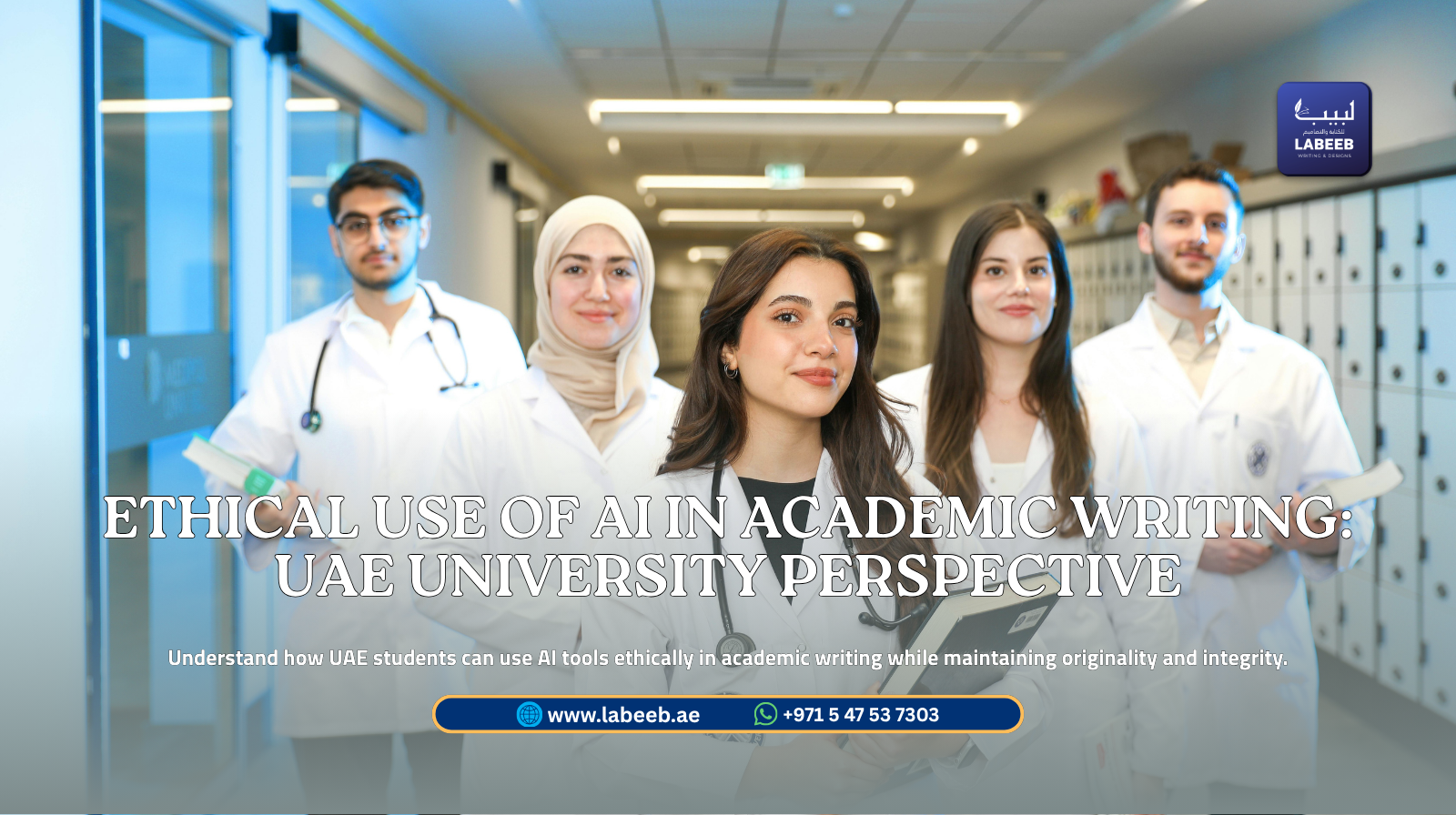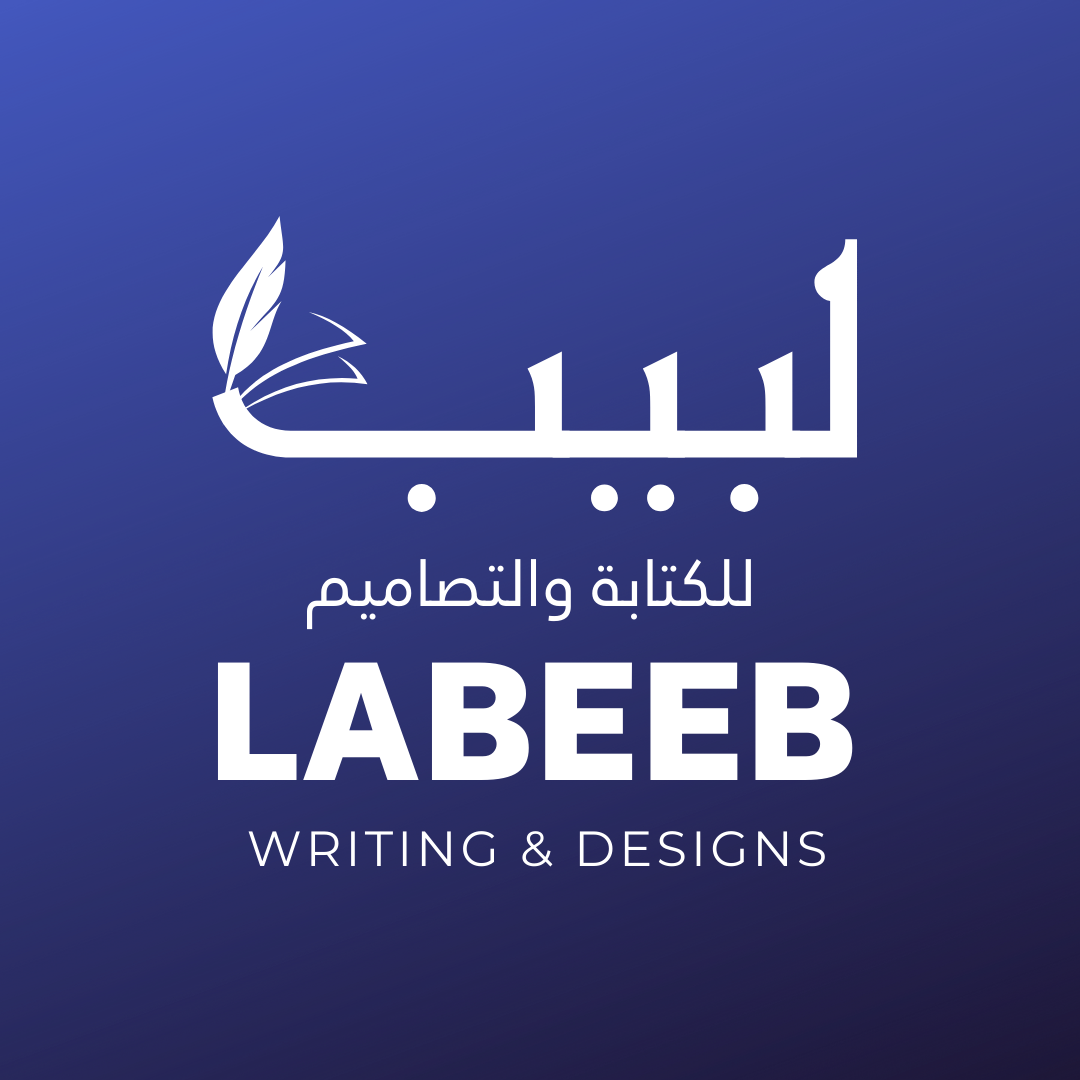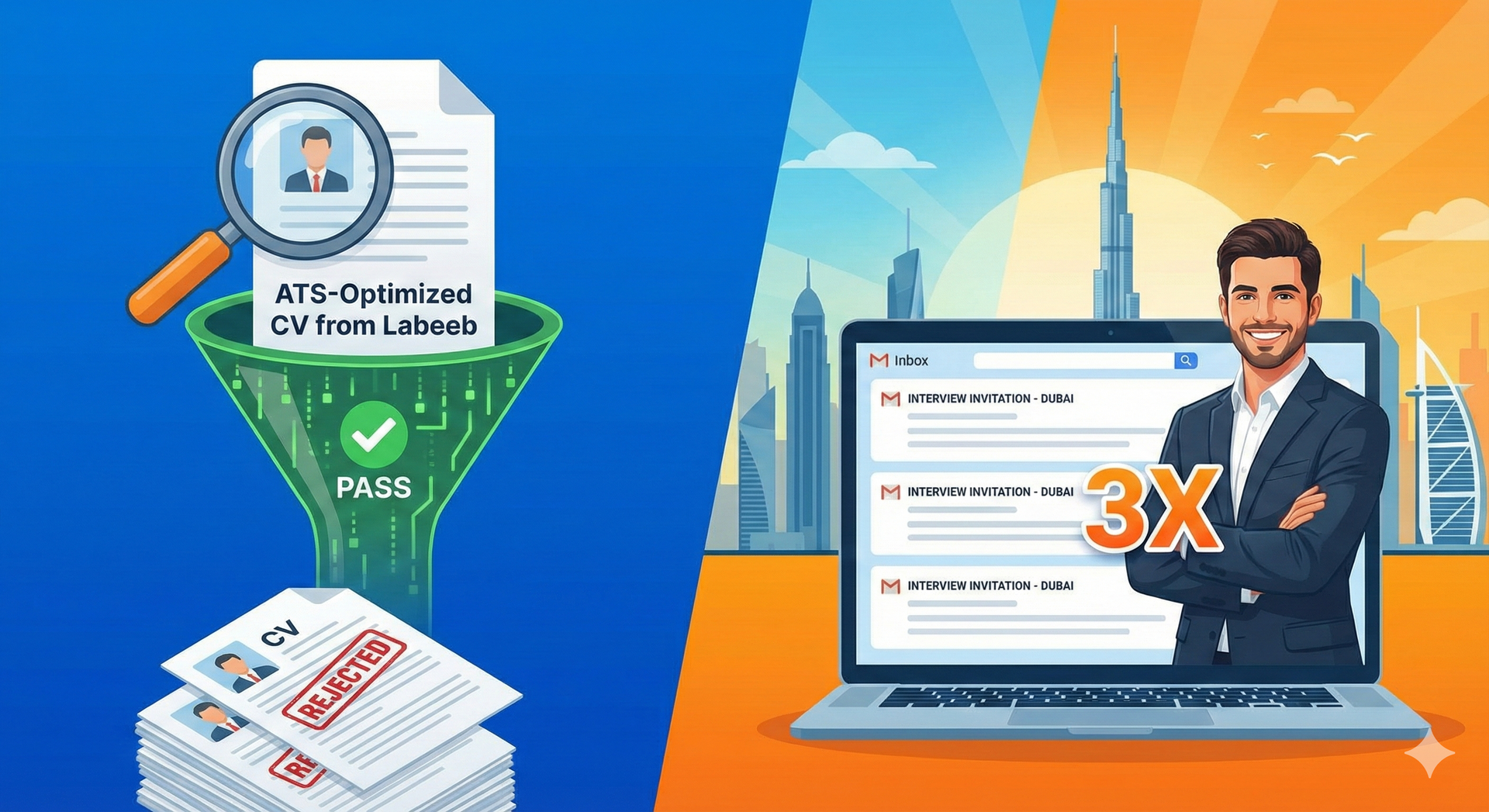Ethical Use of AI in Academic Writing: UAE University Perspective

Artificial Intelligence has rapidly entered classrooms and universities across the UAE — transforming how students research, write, and learn. Tools like ChatGPT, Grammarly, and QuillBot can summarize texts, check grammar, or even suggest entire drafts in seconds.
But as convenient as they are, these tools raise an important question: Where is the ethical line between assistance and academic misconduct?
UAE universities are now taking strong positions on the ethical use of AI in academic writing. This blog explains what’s acceptable, what’s not, and how Labeeb Writing & Designs helps students use AI responsibly while maintaining originality and integrity.
The Rise of AI in UAE Classrooms
In the last two years, AI technology has moved from being a novelty to a daily academic tool. According to Times Higher Education, over 60% of UAE university students admit to using AI for study-related tasks — from generating outlines to checking grammar.
Universities such as Khalifa University, Zayed University, and the University of Dubai have updated academic integrity guidelines to include AI-assisted writing. These updates don’t ban AI entirely but require transparency, responsible use, and citation where appropriate.
What Ethical AI Use Means for Students
Using AI ethically in academic writing doesn’t mean avoiding it altogether. It means using technology to support learning, not replace human effort or creativity.
Here’s how ethical AI usage looks in practice:
- Acceptable:
- Using AI for grammar correction or rephrasing sentences.
- Generating topic ideas or outlines for inspiration.
- Checking structure and flow before submission.
- Unethical:
- Submitting fully AI-generated essays or research papers as your own.
- Using AI to write entire paragraphs without understanding the content.
- Copying AI text without proper editing, citation, or verification.
Simply put, AI should assist your thinking — not do your thinking.
UAE Universities’ Stance on AI and Academic Integrity
Most UAE universities now include “AI misuse” under academic misconduct policies. This means submitting AI-generated work without acknowledgment is treated like plagiarism.
For example:
- Zayed University warns that over-reliance on generative AI may result in penalties similar to plagiarism.
- Khalifa University advises students to declare AI usage in their academic submissions.
- American University in Dubai (AUD) encourages responsible exploration while reinforcing originality as a key academic standard.
Universities emphasize that AI must enhance learning, not replace human reasoning.
How to Use AI Tools Responsibly
Here’s a practical guide for UAE students who want to use AI tools wisely:
1. Use AI for Research Planning, Not Writing
Ask AI for ideas or definitions, but write your own interpretation.
2. Always Verify Information
AI tools can produce inaccurate or outdated facts. Cross-check every claim with academic sources like Google Scholar or ResearchGate.
3. Paraphrase, Don’t Copy
If you use AI-generated content, paraphrase it in your own words and cite the source where applicable.
4. Cite AI Assistance When Required
In APA 7th Edition, AI-generated content can be cited as “personal communication” (e.g., ChatGPT response, OpenAI, 2025).
5. Combine AI with Human Editing
AI can polish grammar, but only human editors ensure tone, logic, and context match university expectations.
By balancing AI with authentic effort, students can save time without compromising ethics.
How Labeeb Writing & Designs Guides Ethical AI Use
Labeeb understands that AI is part of modern learning — but integrity comes first. That’s why the team helps UAE students learn to use AI tools responsibly through mentorship and editing support.
Here’s what makes Labeeb’s approach unique:
- AI Ethics Training: Guidance on how to use AI tools for grammar, structure, and planning without crossing plagiarism boundaries.
- Manual Review Process: Every assignment is checked by human editors for originality and citation accuracy.
- Plagiarism Screening: Turnitin-safe checks ensure no AI-generated duplication.
- Paraphrasing Support: Students learn how to refine AI-suggested text into their own academic voice.
- AI Declaration Assistance: Help drafting short notes of AI tool usage for submission compliance.
By merging technology with academic ethics, Labeeb empowers students to adapt to new learning tools safely and intelligently.
Tools That Can Be Used Ethically
Not all AI tools are risky. When used correctly, some can enhance productivity without violating integrity:
- Grammarly Premium: Ideal for proofreading grammar and punctuation.
- QuillBot: Helps in sentence restructuring and paraphrasing (with human supervision).
- ChatGPT: Useful for idea generation, outlines, and content summarization — when used as reference, not replacement.
- Turnitin AI Detector: Checks if text has AI-generated patterns.
- Labeeb’s Proofreading Services: Human-led review for accuracy, tone, and originality.
These tools complement rather than replace your personal academic contribution.
Balancing AI and Human Creativity
AI is fast — but creativity, analysis, and reasoning are uniquely human. UAE universities encourage students to combine both for best results.
A healthy workflow looks like this:
- Use AI for brainstorming or grammar polishing.
- Write your first draft using your understanding.
- Get professional proofreading to ensure originality and clarity.
- Run a final plagiarism check before submission.
This process ensures your final document remains authentically yours — polished, ethical, and academically credible.
Why Ethical AI Use Matters for Your Future
Academic ethics extend beyond the classroom. Employers in Dubai, Abu Dhabi, and Sharjah now use AI detection tools during recruitment to test authenticity in writing samples or reports.
Students who learn to use AI responsibly build reputations for trustworthiness and professionalism — qualities that stand out in both academic and career environments.
Using AI ethically today prepares you for a future where technology is a tool for growth, not a shortcut.
Want to learn how to use AI tools responsibly in your university work?
Get expert guidance from
AI Academic Writing Ethics Guide by
Labeeb Writing & Designs, supporting students across Dubai, Abu Dhabi, and Sharjah.
Explore:
Stay ahead of technology — with integrity, originality, and professionalism.
Conclusion
Artificial Intelligence is reshaping education in the UAE — but human ethics remain irreplaceable. When used thoughtfully, AI becomes a learning ally rather than a risk.
Labeeb Writing & Designs ensures every student understands the boundary between support and misuse — helping you maintain the credibility that defines academic excellence.
Responsible AI use isn’t about avoiding innovation; it’s about guiding it with wisdom.
Frequently Asked Questions
1. Can UAE universities detect AI-written assignments?
Yes. Most universities now use AI-detection tools integrated with Turnitin to identify machine-generated text.
2. Is it allowed to use ChatGPT for academic writing?
Yes, for brainstorming and structure planning — but you must rewrite and verify the output before submission.
3. How does Labeeb ensure AI-safe content?
All documents undergo manual review and plagiarism screening to eliminate AI patterns and ensure authenticity.
4. Should I mention AI use in my report?
If your professor or university policy requires it, yes — Labeeb can help you phrase it correctly in your acknowledgment section.
Arabic Summary
يشجع التعليم في دولة الإمارات على استخدام الذكاء الاصطناعي بشكل مسؤول في الأعمال الأكاديمية. تقدم لبيب لكتابة وتصميم المحتوى إرشادات متخصصة لمساعدة الطلاب على استخدام أدوات الذكاء الاصطناعي بطريقة أخلاقية، مع الحفاظ على النزاهة الأكاديمية والأصالة. الهدف ليس تجنب التكنولوجيا، بل توظيفها لدعم التفكير والإبداع الحقيقي للطالب.







